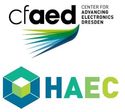1.1 Opening Session: Plenary, Awards Ceremony & Keynote Addresses
Date: Tuesday 20 March 2018
Time: 08:30 - 10:30
Location / Room: Großer Saal
Chair:
Jan Madsen, DATE 2018 General Chair, DTU, DK
Co-Chair:
Ayse Coskun, DATE 2018 Programme Chair, Boston University, US
| Time | Label | Presentation Title Authors |
|---|---|---|
| 08:30 | 1.1.1 | WELCOME ADDRESSES Speakers: Jan Madsen1 and Ayse Coskun2 1DTU, DK; 2Boston University, US |
| 08:45 | 1.1.2 | PRESENTATION OF AWARDS Abstract
|
| 09:15 | 1.1.3 | KEYNOTE ADDRESS: THE RESPONSIBILITY SENSITIVE SAFETY (RSS) FORMAL MODEL TOWARD SAFETY GUARANTEES FOR AUTONOMOUS VEHICLES
Speaker: Amnon Shashua, Intel Corporation, US Abstract In recent years, car makers and tech companies are racing toward self-driving cars. A critical component in getting society acceptance to the technology is to find a way to guarantee safety. The prevailing common wisdom is a data-driven empirical approach for safety validation where the more mileage driven the better the maturity of the system must be. I will describe a model in which the sources of errors due to Planning (the actions and decisions for negotiating motion in traffic) can be fenced out from the data driven approach through a formal model of the common sense behind human judgment of what it means to cause an accident and how to define actions that will guarantee that the AV will never cause an accident due to Planning. The model creates a clear distinction of what can be certified by regulators and what should be left to the judgment of AV manufacturers. The RSS model also puts in context the conversation of "ethical dilemmas" by providing a formal framework for the discussion. |
| 1.1.4 | KEYNOTE ADDRESS: PROGRAMMING LIVING CELLS: DESIGN AUTOMATION TO MAP CIRCUITS TO DNA Speaker: Christopher Voigt, MIT, US Abstract Platforms are being established to to facilitate large genetic engineering projects. A desired cellular function is divided into systems that can be developed independently and then combined. Genetic sensors allow cells to receive environmental and cell state information. Sensory information is integrated by genetic circuits, which control the conditions and timing of a response. The circuit outputs are connected to actuators that control what the cell is doing, from building molecules to moving and communicating. Design automation tools from the electronics industry are applied to map a circuit design to a DNA sequence. Collectively, this enables a wide range of applications, for example cells that communicate to build a material, navigate the human body to treat a disease, or protect plants by responding to the environment. | |
| 10:30 | End of session Coffee Break in Exhibition Area
On all conference days (Tuesday to Thursday), coffee and tea will be served during the coffee breaks at the below-mentioned times in the exhibition area (Terrace Level of the ICCD). Lunch Breaks (Großer Saal + Saal 1)On all conference days (Tuesday to Thursday), a seated lunch (lunch buffet) will be offered in the rooms "Großer Saal" and "Saal 1" (Saal Level of the ICCD) to fully registered conference delegates only. There will be badge control at the entrance to the lunch break area. Tuesday, March 20, 2018
Wednesday, March 21, 2018
Thursday, March 22, 2018
|











